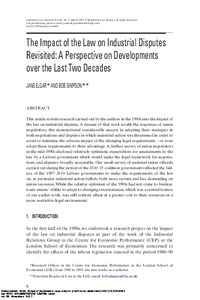The impact of thelaw on industrial disputes revisited: a perspective on developments over the last two decades

2017
46
1
March
6-22
labour law ; labour dispute ; labour relations
Law
http://dx.doi.org/10.1093/indlaw/dww043
English
"This article revisits research carried out by the authors in the 1990s into the impact of the law on industrial disputes. A resumé of that work recalls the responses of union negotiators; this demonstrated considerable success in adapting their strategies in both negotiations and disputes in which industrial action was threatened in order to avoid or minimise the adverse impact of the changing legal requirements—or even adopt these requirements to their advantage. A further survey of union negotiators in the mid-1990s disclosed relatively optimistic expectations for amendments to the law by a Labour government which would make the legal framework for negotiations and disputes broadly acceptable. Our small survey of national union officials carried out during the period of the 2010–15 coalition government reflected the failure of the 1997–2010 Labour governments to make the requirements of the law on, in particular industrial action ballots, both more certain and less demanding on union resources. While the relative optimism of the 1990s had not come to fruition, trade unions' ability to adapt to changing circumstances, which was a central feature of our earlier work, was still evident, albeit at a greater cost to their resources in a more restrictive legal environment. "
Digital
The ETUI is co-funded by the European Union. Views and opinions expressed are however those of the author(s) only and do not necessarily reflect those of the European Union or the ETUI.